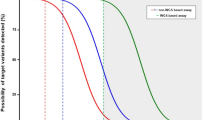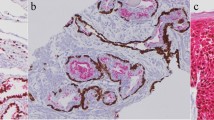Abstract
Aim
Medullary carcinoma is a recently described subtype of mismatch repair deficient (MMRd) colorectal carcinoma (CRC) which, despite being poorly differentiated by traditional morphological criteria, has been reported to have a good prognosis. We investigated the pathological and clinical features of medullary CRC in an unselected cohort of CRCs undergoing surgical resection.
Methods
All CRCs resected within a single health district database from 1998 to 2012 were categorized prospectively and underwent retrospective review to identify 91 medullary CRCs, with 11 additional cases from 2013 to 2014. Strict criteria were employed to diagnose medullary carcinoma requiring both MMRd and greater than 90 % of the tumor to demonstrate typical morphology, including solid growth. The demographic and pathological features, as well as all-cause survival, were compared with other CRCs, and specifically to other MMRd CRCs.
Results
From 1998 to 2012, 91 of 3,295 CRCs (2.8 %) were of the medullary type. Medullary CRC was more likely to arise in females than males (3.3:1; p < 0.0001), the elderly (mean age 77 vs. 71 years; p < 0.001), and the right colon (86 %; p < 0.0001). All medullary CRCs demonstrated MMR deficiency (considered an inclusion criteria) and 86 % were BRAFV600E-mutated (p < 0.0001). Thirty-day mortality after resection was higher in medullary CRC (4.6 vs. 1.7 %; p = 0.049). On univariate analysis, survival was not better than well-differentiated or other MMRd tumors. However, using a multivariate model, a medullary phenotype was protective (hazard ratio of death 0.54, 95 % CI 0.30–0.96; p = 0.037).
Conclusions
Medullary CRC is more common than previously reported, frequently presents with locally advanced disease, and may be associated with higher mortality at 30 days after resection. Despite this, when strict criteria are used for diagnosis, the overall survival is favorable when compared with CRCs with equivalent demographic and pathological characteristics.


Similar content being viewed by others
References
Gibbs NM. Undifferentiated carcinoma of the large intestine. Histopathology. 1977;1:77–84.
Marzouk O, Schofield J. Review of histopathological and molecular prognostic features in colorectal cancer. Cancers. 2011;3:2767–810.
Thirunavukarasu P, Sathaiah M. Medullary carcinoma of the large intestine: a population based analysis. Int J Oncol. 2010;37:901–7.
Fleming M, Ravula S, Tatishchev SF, Wang HL. Colorectal carcinoma: pathologic aspects. J Gastrointest Oncol. 2012;3:153–73.
Hamilton SR, Bosman FT, Boffetta P, et al. Carcinoma of the colon and rectum. In: Hamilton SR, Aaltonen LA, editors. WHO classification of tumours of the digestive system. Lyon: IARC Press, 2010:134–46.
Rüschoff J, Dietmaier W, Lüttges J, Seitz G. Poorly differentiated colonic adenocarcinoma, medullary type: clinical, phenotypic, and molecular characteristics. Am J Pathol. 1997;150:1815–25.
Alexander J, Watanabe T, Wu TT, Rashid A, Li S, Hamilton SR. Histopathological identification of colon cancer with microsatellite instability. Am J Pathol. 2001;158:527–35.
Arai T, Kasahara I, Sawabe M. Microsatellite‐unstable mucinous colorectal carcinoma occurring in the elderly: comparison with medullary type poorly differentiated adenocarcinoma. Pathology. 2007;57:205–12.
Arai T, Esaki Y, Sawabe M, Honma N, Nakamura K-I, Takubo K. Hypermethylation of the hMLH1 promoter with absent hMLH1 expression in medullary-type poorly differentiated colorectal adenocarcinoma in the elderly. Mod Pathol. 2004;17:172–9.
Lanza G, Gafà R, Matteuzzi M, Santini A. Medullary-type poorly differentiated adenocarcinoma of the large bowel: a distinct clinicopathologic entity characterized by microsatellite instability and improved survival. J Clin Oncol. 1999;17:2429–38.
Hinoi T, Tani M, Lucas PC, et al. Loss of CDX2 expression and microsatellite instability are prominent features of large cell minimally differentiated carcinomas of the colon. Am J Pathol. 2001;159:2239–48.
Wick MR, Vitsky JL, Ritter JH. Sporadic medullary carcinoma of the colon: a clinicopathologic comparison with nonhereditary poorly differentiated enteric-type adenocarcinoma and neuroendocrine colorectal carcinoma. Am J Clin Pathol. 2005;123:56–65.
Jessurun J, Romero-Guadarrama M, Manivel JC. Medullary adenocarcinoma of the colon: clinicopathologic study of 11 cases. Hum Pathol. 1999;30:843–8.
Winn B, Tavares R, Fanion J, Noble L, Gao J, Sabo E. Differentiating the undifferentiated: immunohistochemical profile of medullary carcinoma of the colon with an emphasis on intestinal differentiation. Hum Pathol. 2009;40:398–404.
Sugao Y, Yao T, Kubo C, Tsuneyoshi M. Improved prognosis of solid-type poorly differentiated colorectal adenocarcinoma: a clinicopathological and immunohistochemical study. Histopathology. 1997;31:123–33.
Edge SB, Byrd DR, Compton CC, et al. AJCC cancer staging handbook. 7th ed. New York: Springer, 2010:173–206.
Toon CW, Walsh MD, Chou A, et al. BRAFV600E immunohistochemistry facilitates universal screening of colorectal cancers for Lynch syndrome. Am J Surg Pathol. 2013;37:1592–1602.
Toon CW, Chou A, DeSilva K, Chan J, Patterson J. BRAFV600E immunohistochemistry in conjunction with mismatch repair status predicts survival in patients with colorectal cancer. Mod Pathol. 2013;27:644–50.
Bullock M, O’Neill C, Chou A, Clarkson A. Utilization of a MAB for BRAFV600E detection in papillary thyroid carcinoma. Endocr Relat Cancer. 2012;19:779–84.
Hall G, Clarkson A, Shi A, Langford E, Leung H. Immunohistochemistry for PMS2 and MSH6 alone can replace a four antibody panel for mismatch repair deficiency screening in colorectal adenocarcinoma. Pathology. 2010;42:409–13.
Toon CW, Chou A, Clarkson A, et al. Immunohistochemistry for myc predicts survival in colorectal cancer. PLoS ONE. 2014;9:e87456.
Chou A, Toon CW, Clarkson A, et al. Loss of ARID1A expression in colorectal carcinoma is strongly associated with mismatch repair deficiency. Hum Pathol. 2014;45(8):1697–1703.
Houang M, Toon CW, Clarkson A, et al. ALK and ROS1 overexpression is very rare in colorectal adenocarcinoma. Appl Immunohistochem Mol Morphol. Epub 2 Jul 2014. doi: 10.1097/PAI.0000000000000025.
Harrell FE Jr. Regression modeling strategies package for R, version 4.2-0.http://cran.r-project.org/web/packages/rms/index.html. Accessed Jul 2014.
Gafà R, Maestri I, Matteuzzi M, Santini A, Ferretti S. Sporadic colorectal adenocarcinomas with high-frequency microsatellite instability. Cancer. 2000;89:2025–37.
Rosty C, Williamson EJ, Clendenning M, et al. Should the grading of colorectal adenocarcinoma include microsatellite instability status? Hum Pathol. 2014;45(10):2077–84.
Ogino S, Shima K, Meyerhardt JA, McCleary NJ. Predictive and prognostic roles of BRAF mutation in stage III colon cancer: results from intergroup trial CALGB 89803. Clinical Cancer Res. 2012;18(3):890–900.
Disclosure
Robert D. Knox, Nathan Luey, Loretta Sioson, Andrew Kedziora, Adele Clarkson, Nicole Watson, Christopher W. Toon, Carmen Cussigh, Stuart Pincott, Stephen Pillinger, Yasser Salama, Justin Evans, John Percy, Margaret Schnitzler, Alexander Engel, and Anthony J. Gill report no conflict of interest.
Funding support
This study was supported by funding from the Cancer Institute NSW as part of a translational research center grant.
Author information
Authors and Affiliations
Corresponding author
Additional information
Alexander Engel and Anthony J. Gill have contributed equally to this manuscript.
Electronic supplementary material
Below is the link to the electronic supplementary material.
10434_2014_4355_MOESM1_ESM.tiff
Typical morphology and immunohistochemical profile of medullary carcinoma. A,B,C – The tumour demonstrates a solid architecture with a lobulated, pushing growth pattern. D,E – The tumour grows as solid sheet of malignant cells with conspicuous nucleoli, prominent cytoplasm and frequent intra-epithelial lymphocytes. F – The tumour shows mismatch repair deficiency (MMRd) in this case characterised by loss of staining for PMS2 in all malignant cells, with preserved positive staining in non-neoplastic cells which act as an internal positive control. (A H&E 100x, B H&E 1000x, C H&E 200x, D H&E 200x, E H&E400x, F MLH1 IHC 400x) (TIFF 18371 kb)
Rights and permissions
About this article
Cite this article
Knox, R.D., Luey, N., Sioson, L. et al. Medullary Colorectal Carcinoma Revisited: A Clinical and Pathological Study of 102 Cases. Ann Surg Oncol 22, 2988–2996 (2015). https://doi.org/10.1245/s10434-014-4355-5
Received:
Published:
Issue Date:
DOI: https://doi.org/10.1245/s10434-014-4355-5




